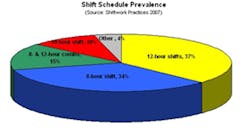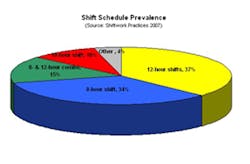Which are better: 8-hour shifts or 12-hour shifts? Are certain shift lengths associated with greater employee satisfaction, better safety and higher productivity rates?
According to a survey by Circadian, there are no simple answers to those questions. Extensive scientific research on the effects of 8- and 12-hour shifts has produced no clear winner. Which works best depends on the facility, the type of work and, most importantly, if management has obtained employee buy-in. Companies across America are fairly evenly divided between 8- and 12-hour shifts: In a Circadian survey of 400 shiftwork operations, 37 percent were using 12-hour shifts while 34 percent were using 8-hour shifts.
According to Circadian, the “perfect” shift schedule for each facility depends on a large number of factors, including business needs, the nature of the job tasks performed and work force demographics and preferences.
The vast majority of shiftwork studies that compare accident and error rates before and after a schedule change found no difference between 8-hour shifts and 12-hour shifts. In one study, a decrease from three to two shift handovers per day following a switch from 8-hour shifts to 12-hour shifts was thought to have reduced operator error. On the other hand, two studies cited accumulated sleep debt and recommend against 12-hour shifts, especially schedules entailing more than three or four 12-hour shifts in a row.
What Matters
One thing most of the studies about length of shifts and their impact on work and workers agree upon is that the way an operation implements a shift schedule has a substantial impact on the employees’ acceptance of it. Employee participation and sense of control is crucial to their satisfaction with and attitude toward a new schedule.
Circadian notes that facilities in various industries reported positive results when employees participated in negotiating changes such as shift start and end times, provision of an extra break during 12-hour shifts and improved meal facilities at night. At one plant in which the schedule was imposed with no employee input, worker reactions were so negative that the old schedule had to be reinstated.
Circadian has developed a Shift Scheduling Optimization Process to help companies determine which schedule is right for your operation.


